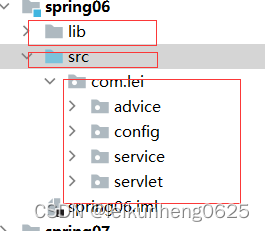spring框架注解(纯注解)
Spring有哪些常用注解呢?
Spring常用注解
Web:
@Controller:组合注解(组合了@Component注解),应用在MVC层(控制层)。
@RestController:该注解为一个组合注解,相当于@Controller和@ResponseBody的组合,注解在类上,意味着,该Controller的所有方法都默认加上了@ResponseBody。
@RequestMapping:用于映射Web请求,包括访问路径和参数。如果是Restful风格接口,还可以根据请求类型使用不同的注解:
@GetMapping
@PostMapping
@PutMapping
@DeleteMapping
@ResponseBody:支持将返回值放在response内,而不是一个页面,通常用户返回json数据。
@RequestBody:允许request的参数在request体中,而不是在直接连接在地址后面。
@PathVariable:用于接收路径参数,比如@RequestMapping(“/hello/{name}”)申明的路径,将注解放在参数中前,即可获取该值,通常作为Restful的接口实现方法。
@RestController:该注解为一个组合注解,相当于@Controller和@ResponseBody的组合,注解在类上,意味着,该Controller的所有方法都默认加上了@ResponseBody。
容器:
@Component:表示一个带注释的类是一个“组件”,成为Spring管理的Bean。当使用基于注解的配置和类路径扫描时,这些类被视为自动检测的候选对象。同时@Component还是一个元注解。
@Service:组合注解(组合了@Component注解),应用在service层(业务逻辑层)。
@Repository:组合注解(组合了@Component注解),应用在dao层(数据访问层)。
@Autowired:Spring提供的工具(由Spring的依赖注入工具(BeanPostProcessor、BeanFactoryPostProcessor)自动注入)。
@Qualifier:该注解通常跟 @Autowired 一起使用,当想对注入的过程做更多的控制,@Qualifier 可帮助配置,比如两个以上相同类型的 Bean 时 Spring 无法抉择,用到此注解
@Configuration:声明当前类是一个配置类(相当于一个Spring配置的xml文件)
@Value:可用在字段,构造器参数跟方法参数,指定一个默认值,支持 #{} 跟 ${} 两个方式。一般将 SpringbBoot 中的 application.properties 配置的属性值赋值给变量。
@Bean:注解在方法上,声明当前方法的返回值为一个Bean。返回的Bean对应的类中可以定义init()方法和destroy()方法,然后在@Bean(initMethod=”init”,destroyMethod=”destroy”)定义,在构造之后执行init,在销毁之前执行destroy。
@Scope:定义我们采用什么模式去创建Bean(方法上,得有@Bean) 其设置类型包括:Singleton 、Prototype、Request 、 Session、GlobalSession。
实体类和接口代码
@Component
public class BookServiceimpl implements BookService {
@Override
public void add() {
System.out.println("添加");
}
@Override
public void del() {
System.out.println("删除");
}
@Override
public void update() {
System.out.println("修改");
}
@Override
public void find() {
System.out.println("查询");
}public interface BookService {
void add();
void del();
void update();
void find();
}@Configuration //表示该类是配置类
@ComponentScan("com.lei")
@EnableAspectJAutoProxy
public class SpringConfig {
}@Component
@Aspect
public class Loger {
@Before("execution(* *..BookServiceimpl.*(..))")
public void check(){ System.out.println("前置通知/增强:执行系统的权限验证"); }
@AfterReturning("execution(* *..BookServiceimpl.*(..))")
public void logPrint(){ System.out.println("后置通知/增强:执行日志的打印"); }
@AfterThrowing("execution(* *..BookServiceimpl.*(..))")
public void exeption(){ System.out.println("异常通知/增强:做出异常的通知"); }
@After("execution(* *..BookServiceimpl.*(..))")
public void distory(){ System.out.println("最终通知/增强:资源的释放"); }
}
public class Test01 {
@Test
public void test01(){
AnnotationConfigApplicationContext context=new AnnotationConfigApplicationContext(SpringConfig.class);
BookService bookService=context.getBean(BookService.class);
bookService.add();
bookService.del();
bookService.update();
bookService.find();
}